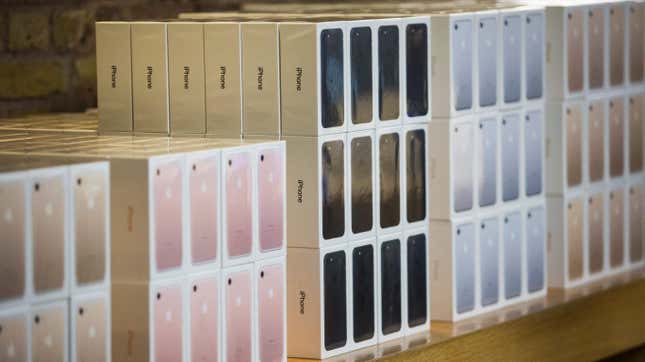
The Brazilian government’s going to battle with Apple over its chargers, or more aptly, its lack of them. On Tuesday, Brazil’s Justice Ministry reportedly hit the smartphone giant for 12.275 million reais (or around $2.38 million) and ordered Apple to cease selling models that don’t ship with a charger. That sudden cancellation, according to Reuters, would affect Apple’s iPhone 12 and 13 models. The iPhone 12 hasn’t shipped with a charger since 2020.
Apple and other device makers claim the decision to withhold chargers and other accessories from devices represents an earnest attempt to limit the amount of junk and e-waste piling up in users’ cabinets. Data released earlier this year by the European Parliament estimates unused and discarded chargers could make up around 11,000 metric tons of e-waste annually in Europe alone. Brazilian officials aren’t buying that reasoning, though, and argue the lack of chargers amounts to a “deliberate discriminatory practice against consumers,” according to Reuters. The officials claimed iPhones shipped without chargers lack an essential component and are essentially incomplete products.
Apple’s not alone here, though. Samsung, for example, no longer includes earbuds or chargers on several of its Galaxy models, and Google’s Pixel 6 shipped without a charger last year. Xiaomi also stopped including charging bricks starting with its Mi 11 phone after first poking fun at Apple’s decision.
It’s unclear if Brazil’s new rules will also extend to these companies. Notably, Apple’s overall presence in Brazil is much smaller than in other markets like the U.S. According to Counterpoint Research, Apple held just 5.7% of the Brazilian smartphone market share in Q1 2018, compared to 45.6% market share held by Samsung.
Apple did not immediately respond to Gizmodo’s request for comment.
Brazil pushing against a wider trend
The Brazilian government’s crusade against Apple’s charger choices comes as regulators in other regions are implementing rules aimed at limiting the number of unnecessary chargers produced. In June, after years of debate, European lawmakers reached a provisional agreement that will implement a USB-C charging port standard for smartphones, tablets, cameras, and other devices sold in the region by Autumn 2024. In theory, that standardization process would mean users would only really need one type of charger for their increasing armory of electronics. Another report released by Bloomberg around the same time suggests Apple’s already testing USB-C compatibility on its iPhones.
Europe’s not the only one signaling an appetite for some charger change. Earlier this year, Sen. Ed Markey (D-MA), Sen. Elizabeth Warren (D-MA), and Sen. Bernie Sanders (I-VT) wrote a letter calling on the U.S. Commerce Department to put forward its own rules for a universal charging standard. Like the European lawmakers, the U.S. senators’ rule limiting different types of charges could help reduce e-waste.
“As specialized chargers become obsolete with the introduction of new products, or as consumers change the brand of phone or device that they use, their outdated chargers are usually just thrown away,” the lawmakers wrote in the letter. “When electronics are not disposed of properly, e-waste can spread toxins in water, pollute soil, and degrade the air we breathe.”
At the same time, these differing approaches all come from the same problem— charging as it exists right now is not convenient for customers.